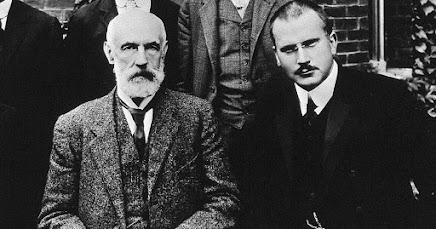Research Blog #7: Theoretical Frame
The main theoretical frame that I plan to focus on is Sigmund Freud's concept of the unconscious mind. Since the unconscious mind holds unpleasant feelings, thoughts, urges, and memories that are deep within and not available at a conscious level. It can also hold our repressed feelings or hidden memories, and this in some form could be a déjà vu experience. Freud believes that since déjà vu is unconscious, “the content of the fantasy is blocked from awareness, but the sense of familiarity leaks through and results in the déjà vu experience" (“What Exactly Is Déjà Vu?”). Freud’s interpretation of the unconscious mind also plays a role in Freud’s theories of anxiety, which is a another theoretical frame I use throughout my research paper to explain déjà vu. His first theory suggests that anxiety is pathological and the result of extreme sexual frustration. His second theory explains that anxiety has both pathological and adaptive functions. Pathological anxiety involves a memory trace of a traumatic event and can be the result of substantial regression. This regression “leads to the loss of the distinction between past and present, resulting in the patient regressively experiencing in the present the terror he faced at an earlier time in his life” (Hurvich 488). Now this concept of regression can be related to the experience of déjà vu. Déjà vu can also create a similar feeling and can also be due to one’s anxiety experience. After an individual experiences a certain traumatic event, they might develop persistent anxiety and believe that this certain event will occur again. This will then make the individual feel as if they are reliving this experience in their active conscious or in their dreams. Reliving the same experience may trigger that strange sensation of déjà vu and in return can generate more anxiety.
Another theoretical frame I use throughout my research paper is the concept of dreams and its relation to déjà vu and also the unconscious mind. When an individual is in a dream state, the dream resembles real life in terms of people, objects, colors, and sounds. While most of the time, dreams consist of places and people we are familiar with, sometimes individuals dream about certain places and people that they are unfamiliar with. While there is no significant evidence showcasing how déjà vu can affect dreams, the memory of dreams could play a role in déjà vu and can explain this feeling of unfamiliarity. There are three different ways dreams and déjà vu are connected. The first one is that certain déjà vu experiences happen to duplicate events that occurred during a dream. The second connection relates to the parts of dreams that we remember that may connect to stimuli we face when we are awake, causing our mind to trick us into thinking this experience already happened. The third connection is déjà vu occurring in the dream itself. Some individuals have stated that they experienced déjà vu in a dream and realized it as well. Dreams can be interpreted as being a part of the unconscious mind. More so, having a strange dream could be a sign from your unconscious mind telling you to look deeper into the dream and find the meaning behind it. This is also similar to déjà vu in terms that déjà vu can make one look into the meaning behind why they had this experience. Dreams and déjà vu have the ability to cause individuals to look for a deeper meaning and may even cause negative effects such as increased anxiety.
Hurvich, M. “Classics Revisited : The Ego in Anxiety (Max Schur, 1953) and, an Addendum to Freud’s Theory of Anxiety (Charles Brenner, 1953).” Psychoanalytic Review (1963), vol. 84, no. 4, Guilford, 1997, pp. 483–521.
“What Exactly Is Déjà Vu?” Scientific American, Scientific American, 13 May 2002, www.scientificamerican.com/article/what-exactly-is-dj-vu/.

Comments
Post a Comment